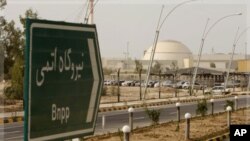U.S. officials say the United States continues to focus on a diplomatic solution to the standoff with Iran over its nuclear program. Our correspondent reports on remarks Monday by President Barack Obama's spokesman and the State Department in response to questions about an expected International Atomic Energy Agency report on Iran.
Questions about the IAEA report, some details of which have been leaked in advance of its formal submission by the Vienna-based agency, led the White House news briefing.
Media reports have focused on some key findings. Israeli media outlets have reported on intense government and public debate there about a potential preemptive military strike on Iran.
A Washington Post newspaper report said Western diplomats and nuclear experts who reviewed the intelligence believe Iran has taken key steps in overcoming technical challenges in developing an atomic weapon, with the help of foreign scientists. Iran maintains that its nuclear program is for peaceful purposes.
White House Press Secretary Jay Carney said the IAEA report is expected to "echo and reinforce" concerns about Iran's behavior and its failure to comply with international obligations, adding that international sanctions on Iran have been effective.
Carney said the United States continues to pursue a diplomatic approach, but he repeated the longstanding position that no option can be ruled out. He responded this way when asked how the Washington would view a preemptive strike by Israel on Iranian nuclear facilities:
"We are certainly now in a situation that did not exist before, where because of the dual-track approach this president took and this administration took, it is now clear to the world that the U.S. is not the issue here, it is Iran, it is Iranian behavior," said Carney. "That has allowed us to mobilize the international community in a way that hasn't existed in the past, and to come together putting pressure on Iran to change its behavior."
Carney had much the same response when asked what President Obama plans to do after the IAEA report is issued, and about the effectiveness of sanctions on Iran.
At the State Department, Spokeswoman Victoria Nuland said the United States and other countries have had preliminary briefings.
"I think we have had a sense from the [IAEA] director general's office of what the report will encompass and some of the places that it might point to difficulty," said Nuland. "But again, until the report is finalized, until he has briefed it, I don't want to get ahead of him [the IAEA director general]."
Nuland repeated the U.S. and international position that Iran is permitted to use its nuclear program for peaceful purposes, as long as it is transparent and allows full inspections. But she said Iran has not allowed full inspections and exchanges of information that would reassure the world, and that Tehran has continued enriching uranium to more than 20 percent - well beyond what is needed for peaceful energy purposes.
At last week's G20 summit in France, President Obama said Iran's nuclear program poses a "continuing threat," and urged Tehran to meet its nuclear obligations.
Asked on Monday whether Mr. Obama might make a new statement on the Iranian nuclear issue, Jay Carney only repeated that the president would not comment on the issue before the report is formally released.
US Expects IAEA Report to Reflect Concerns Over Iran Nuclear Program
- By Dan Robinson












